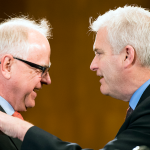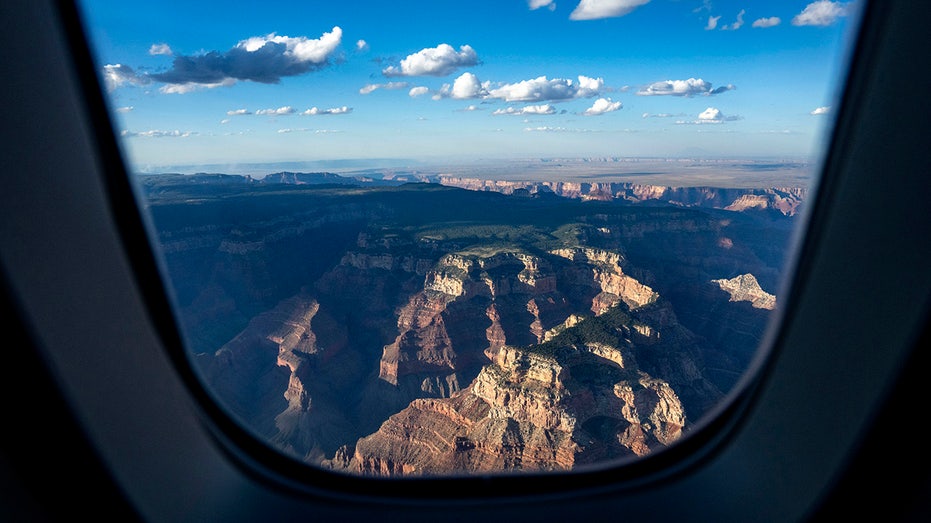President Biden is to announce a historic national park designation for the Grand Canyon Tuesday as part of a $44 million commitment “to strengthen climate resilience across our national park system.”
The move effectively blocks future mining of uranium, the key element used to power nuclear reactors and for other medical, industrial and defense purposes.
A White House official said the Baaj Nwaavjo I’tah Kukveni – Ancestral Footprints of the Grand Canyon National Monument in Arizona – will conserve nearly 1 million acres of greater Grand Canyon landscape sacred to Tribal Nations and Indigenous peoples and advance “Biden’s historic climate and conservation agenda.”
This is the fifth new national monument created by Biden. As for its name, “Baaj nwaavjo” means “where Indigenous peoples roam” in the Havasupai language, and “i’tah kukveni” means “our ancestral footprints” in the Hopi language. The administration said it protects thousands of cultural and sacred sites that are precious to Tribal Nations in the Southwest.
US MULLS SENDING TOP-SHELF DEPLETED URANIUM TANK ROUNDS TO UKRAINE
Biden will sign the proclamation at Red Butte, a sacred site called Wii’i Gdwiisa by the Havasupai, which towers above the southern portion of the monument.
Biden “is ensuring that the Grand Canyon and iconic American treasure will stay pristine for future generations,” White House Counsel Environmental Quality Chair Brenda Mallory told reporters Monday. “And he is doing so in a way that recognizes this and supports the importance of hunting and fishing in the area, protects existing grazing permits and leases and fully protects private property rights.”
“This president and this administration see Indian Country. I’m speaking to you as the first Native American Cabinet secretary,” Interior Secretary Deb Haaland added. “As a testament to that feeling seen as being appreciated for who we are, the original stewards of our shared lands and waters.… We are putting historic and once in a generation, resource into Indian Country. It also means recognizing the power of indigenous knowledge as a key part of collaborative conservation.”
A White House fact sheet said the national monument designation “recognizes and respects valid existing rights,” noting existing mining claims – predating a 20-year mineral withdraw initiated in 2012 – will remain in place, and the two approved mining operations within the boundaries of the monument would be able to operate.
A senior administration official further told reporters the 20-year mineral withdrawal remains in effect, so the national monument designation “will preserve the status quo by not allowing new mining claims to be put into effect.”
“Just backing out the broader picture here is that this area represents about 1.3% of the nation’s known and understood uranium reserves,” the official said. “So there are significant resources in other parts of the country that will remain accessible.”
The Interior Department, reacting to concerns over the risk of contaminating water, enacted a 20-year moratorium on the filing of new mining claims around the national park in 2012.
Yet, a U.S. Geological Survey in 2021 found most springs and wells in a vast region of northern Arizona known for its high-grade uranium ore meet federal drinking water standards despite decades of uranium mining. Mining companies and the areas that would benefit from their business remain vehemently opposed to the national monument designation.
Buster Johnson, a Mohave County supervisor, said the monument proposal feels solely politically driven and that there should have been another hearing on the matter. He does not see the point of not tapping into uranium and making the country less dependent on Russia.
GRAND CANYON HIKER DIES AFTER FALLING UNCONSCIOUS DURING 8-MILE TREK IN EXTREME HEAT
“We need uranium for the security of our country,” Johnson told The Associated Press. “We’re out of the game.”
No uranium mines are operating in Arizona, according to AP, although the Pinyon Plain Mine, just south of Grand Canyon National Park, has been under development for years. Other claims are grandfathered in. The federal government has said nearly a dozen mines within the area that have been withdrawn from new mining claims could still potentially open, even with the monument designation, because their claims were established before 2012.
In 2017, then-President Obama backed off a full-on monument designation. The idea faced a hostile reception from Arizona’s Republican governor and two senators. Then-Gov. Doug Ducey threatened legal action.
Opponents of establishing a monument have argued it would not help combat a lingering drought and could prevent thinning of forests and stop hunters from keeping wildlife populations in check. Ranchers in Utah near the Arizona border say the monument designation would strip them of privately owned land.
Ahead of the one-year anniversary of the Inflation Reduction Act, the Biden administration will also announce $44 million “to strengthen climate resilience across America’s iconic National Parks system, including 43 projects across 39 states, Washington, D.C., Puerto Rico, and the U.S. Virgin Islands.”
The White House said the designation recognizes and is a step toward addressing “the history of dispossession and exclusion of Tribal Nations and Indigenous peoples in the area.”
The creation of the Grand Canyon monument follows Biden’s announcement of the Emmett Till and Mamie Till-Mobley National Monument in Illinois and Mississippi last month.
Fox News’ Tara Prindiville, Caroline McKee and The Associated Press contributed to this report.
























